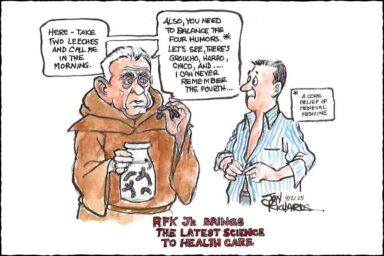Lack of Sick Leave a Major Factor in Spread of Foodborne Illnesses
Many of the outbreaks of foodborne illnesses at restaurants and other food establishments in the US could be prevented if these eateries offered paid sick leave to their employees, according to a CDC report released today.
|
Listen To This Story
|
Many of the outbreaks of foodborne illnesses at restaurants and other food establishments in the US could be prevented if these eateries offered paid sick leave to their employees or, at the very least, had policies in place that kept them away from work when they are unwell. That is the main takeaway of a Centers for Disease Control and Prevention (CDC) report released today.
“Ill workers continue to play a substantial role in retail food establishment outbreaks, and comprehensive ill worker policies will likely be necessary to mitigate this public health problem,” the report stated.
The researchers looked into a total of 800 foodborne illness outbreaks reported in the US during 2017 to 2019. They found a strong correlation between these outbreaks and sick employees who showed up to work.
“Approximately 40% of outbreaks with identified contributing factors had at least one reported factor associated with food contamination by an ill or infectious food worker,” the report stated.
Foodborne diseases are a major public health issue in the US. The CDC estimates that 48 million Americans annually get sick from them, 128,000 are hospitalized, and 3,000 die from them. The two most common types are caused by salmonella bacteria and norovirus. The former is responsible for most hospitalizations and deaths related to foodborne illnesses.
The vast majority of the restaurant managers the CDC interviewed said their establishment had policies in place requiring food workers to notify their supervisors if they were sick and to stay home in that case. However, these policies are often not written down.
“Although research suggests that written policies are more effective than verbally communicated policies, the existence of written policies alone is unlikely to markedly reduce incidence of foodborne illness outbreaks in retail establishments,” the report states.
In addition, in most cases, these policies did not list all of the five illness symptoms (vomiting, diarrhea, jaundice, sore throat with fever, and lesion with pus) that food workers should notify their managers about.
Furthermore, the CDC found that only about 1 in 6 of the establishments with outbreaks had comprehensive policies in place that required workers to notify a manager, included all of the symptoms requiring such a notification, and mandated them to stay home or not perform certain tasks when sick.
So why do restaurant employees show up for work even when they are ill? Because they need the money, and too few restaurants and other eating establishments offer sick leave.
“Food workers report numerous reasons for working when ill, such as loss of pay and perceived social pressure,” the report stated, adding that the data that the CDC had examined showed that “fewer than half of establishments with outbreaks provided paid sick leave to at least one food worker.”
The CDC concludes that offering paid sick leave to food workers would help reduce the outbreaks of foodborne illnesses.




